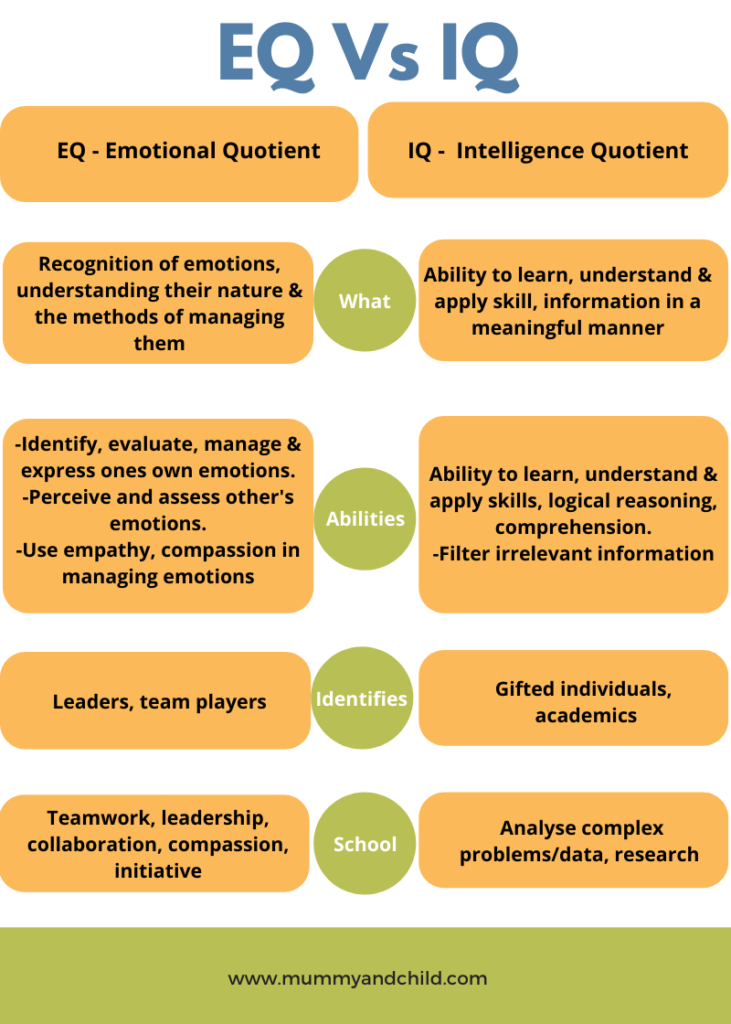
Why Having Good Emotional Intelligence is as Important as Academic Excellence?
As parents, we want our children to excel academically and achieve great things. We invest time, resources, and effort into providing them with the best education, tutoring, and opportunities. However, amidst our focus on academic success, we often overlook a crucial aspect of our children’s development: Emotional Intelligence.
Emotional intelligence plays a significant role in our children’s overall well-being, personal growth, and future success. It refers to their ability to recognize, understand, manage, and express their emotions effectively.
EQ vs IQ: THE DIFFERENCE?
EQ (Emotional Quotient) and IQ (Intelligence Quotient) measure different aspects of intelligence. EQ focuses on emotions, interpersonal skills, and empathy, while IQ assesses cognitive abilities like logical thinking and problem-solving. EQ can be developed and is important for communication and relationships, while IQ is often associated with academic performance. Both types of intelligence play a role in overall success, but EQ is increasingly recognized as essential for personal and professional growth in today’s world.
The key aspects that determine emotional intelligence include:
- Self-awareness: Recognizing and understanding one’s own emotions.
- Emotional regulation: Managing and controlling emotions and impulses.
- Building Empathy:Understanding and sharing the feelings of others.
- Social skills: Building and maintaining positive relationships.
- Motivation: Setting and achieving goals.
Why is it important to nurture your child’s EQ?
- Better Academic Performance
Research suggests that emotional intelligence positively correlates with academic achievement. Children with higher emotional intelligence are better able to concentrate, manage stress, and develop positive relationships with teachers and peers.
- Empathy and Compassion
“No one cares how much you know, until they know how much you care.” – Theodore Roosevelt
Emotional intelligence fosters empathy and compassion in children. They learn to understand and share the feelings of others, which promotes positive social interactions, cooperation, and kindness. - Emotional Regulation
Developing emotional intelligence equips children with the skills to effectively manage and regulate their emotions. Research conducted by Yale University found that individuals with higher emotional intelligence experience reduced levels of stress, anxiety, and depression. - Healthy Relationship
Emotional intelligence plays a vital role in building and maintaining healthy relationships. Children with high EQ can understand the feelings and perspectives of others, communicate effectively, resolve conflicts amicably, and exhibit empathy.
Here are a few tips to develop your child’s emotional quotient:
- Help your child identify and label their emotions.
- Practice active listening and effective communication.
- Encourage social interactions for developing social skills.
- Encourage open and honest communication about emotions within the family.
- Encourage self-expression through art, writing, or other creative outlets.
- Promote gratitude and positive thinking.
- Help them develop self-compassion and acceptance of their own emotions.
- Encourage self-care and stress management techniques.

EQ + IQ: THE POWER OF INTEGRATION
EQ and IQ are equally important and powerful when integrated. They enhance decision-making, foster strong relationships, promote adaptability and resilience, support effective leadership, and facilitate successful collaboration. Embracing the combination of EQ and IQ enables individuals to navigate various aspects of life with a holistic and well-rounded approach, leading to greater personal and professional success.
Academic excellence is undoubtedly essential for future success, but it is equally crucial for parents to recognize the significance of emotional intelligence in their children’s lives. By nurturing emotional intelligence, parents provide their children with a solid foundation for healthy relationships, adaptability, resilience, and effective leadership. As we strive to raise well-rounded individuals, let us remember that emotional intelligence is a powerful asset that can shape their lives in profound and meaningful ways.
